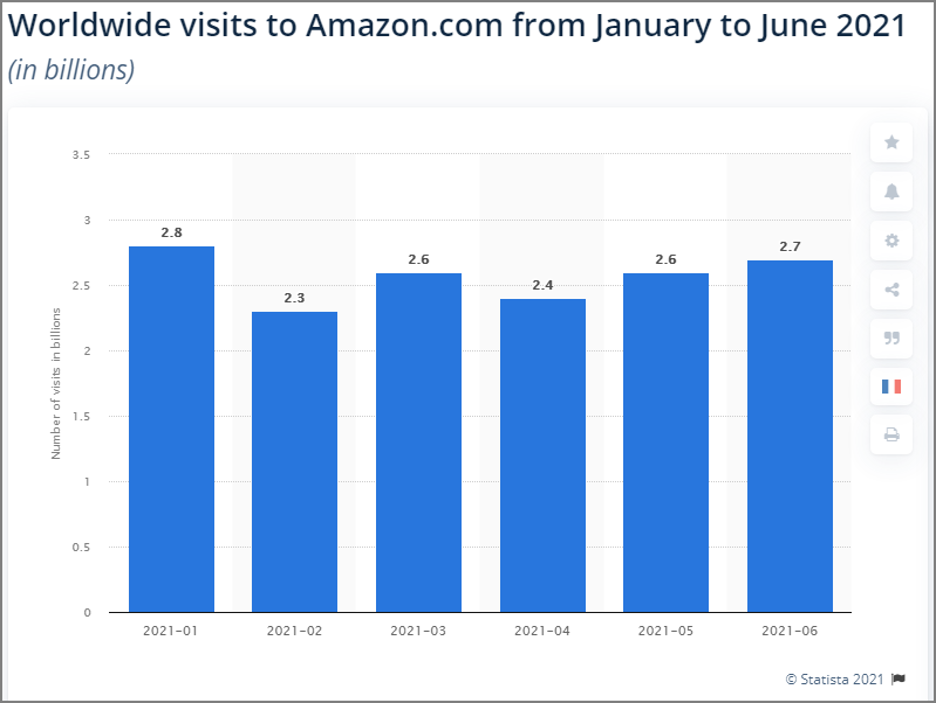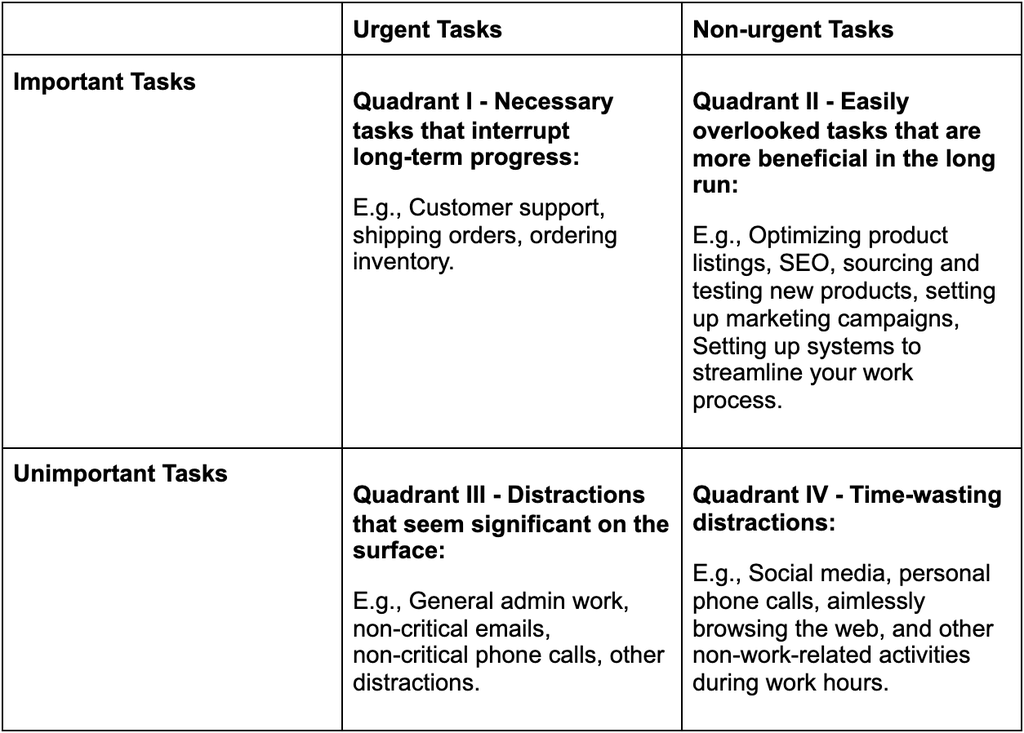7 Signs That Show You Have The Potential to Make Massive Profits Selling on Amazon
Posted: October 5th, 2021
Amazon is undoubtedly an e-commerce juggernaut, boasting an average of 2.6 billion monthly visitors in 2021. With such staggering traffic, it’s clear why so many people want to sell on Amazon and claim a small piece of that gigantic pie.

But the thing is, the internet is chock-full of articles and videos talking about how to start selling on Amazon. But, very few people address what it takes for one to be successful on Amazon. We might all want to join the Amazon marketplace and make a boatload of money, but realistically, not everyone that joins Amazon as a seller becomes successful. In this blog post, we’re going to take an in-depth look at the signs you should look out for to know if you have what it takes to be a successful Amazon seller. Sounds good? Let’s dive in.
#1 The Mindset
Amazon selling is a business in itself. To succeed as an Amazon seller, you need to have a business mindset. But, what exactly is a business mindset? See, anyone can have a business idea. But, turning that idea into a profitable business is what separates the true entrepreneurs from the wannabes. Let’s look at the tenets of a business mindset.
Long-term Thinking and Planning
For starters, selling on Amazon is not a get-rich-quick scheme. It may take some months to start seeing tangible results. That’s why you need to be able to look at the bigger picture and think long-term. Most new e-commerce entrepreneurs tend to fall for the “shiny object syndrome.” The “shiny object syndrome” is where an entrepreneur jumps from one strategy to another or from one trend to another, believing that that trend will make them a lot of money in a short time.
Such entrepreneurs tend to waste a lot of time and money going round in circles chasing the pot of gold at the end of the rainbow. Ultimately, such an entrepreneur will burn themselves out with nothing to show for their efforts. When you look at the bigger picture, you can create an evergreen business by selling products whose demand isn’t based on a fad. You can then build an Amazon brand that grows exponentially, giving you a stable stream of income.
Growth Vs. Fixed Mindset
A growth mindset is a belief that you can improve your skills and knowledge over time. A fixed mindset is the opposite. It’s a belief that your skills and expertise are fixed traits that you can’t improve. When starting as an Amazon seller or any other business, you will face some challenges and probably fail a couple of times.
A person with a growth mindset will use their failure as a learning experience, dust themselves, correct their mistake, and try again. A person with a fixed mindset will chalk up their failure to a lack of ability and conclude that they just can’t succeed. If you’re going to be successful on Amazon, you’ll need a growth mindset. You’ll need to be adaptive and be willing to learn and implement new strategies.
Creativity
“Creativity is the mother of invention.” This phrase rings true in the world of entrepreneurship, especially if you’re in a field as competitive as selling on Amazon. A common misconception is that creativity only comes in handy when you’re in the creative industry. But, creativity is a requirement for success in all sectors. When selling on Amazon, you’re going to be competing against thousands of other sellers in your niche. Just being average isn’t going to cut it in such a cutthroat environment. You need to be creative to develop ways to position your products as the best option for the customer. Whether through exceptional branding, kickass marketing campaigns, or a unique brand voice.
#2 You’re Competitive

Image courtesy of Marketplace Pulse
Amazon currently has over 6 million total registered sellers. 1.5 million of these sellers are actively selling on Amazon. Joining a marketplace with over 1.5 million active sellers paints a clear picture of the competition you’re going to face. Don’t fret though, competition is a good thing. It pushes you out of your comfort zone and forces you to improve yourself, and your business. Getting into the Amazon marketplace with a competitive mindset will help you develop creativity, achieve clarity, and have an urge to learn and put in the work to dominate your competition. All these things will help you build an Amazon brand that will be a force to reckon with.
#3 You’re Willing to Invest
“It takes money to make money, even begging.” - Sol Luckman. Most people like to think they can start selling on Amazon with nothing and bootstrap their way to the top. Well, it doesn’t work like that. Selling on Amazon requires an upfront capital investment. According to a study by Jungle Scout, new sellers spend an average of $3,836 to launch their Amazon businesses.
A chart showing the starting capitals for different Amazon sellers.
You’ll need to buy sample products from potential suppliers. Having an Amazon Seller Central account will cost you $39.99 per month. You’ll also need to purchase and ship products from the supplier to the warehouse. All these and other operations related to selling on Amazon will cost you money, so you must be willing to invest some money into the business if you want to be a successful Amazon seller. Otherwise, your journey will have ended before it even began.
#4 You’re Innovative
What do all the successful entrepreneurs like Steve Jobs, Elon Musk, and even Jeff Bezos have in common? They’re all innovators. Innovation is a leading contributor to a business’s success. This includes the business of selling on Amazon. And when you’re in a business as competitive as selling on Amazon, innovation becomes a necessity.
One of the ways to be innovative in the Amazon marketplace is by private labeling your products. Private labeling is simply selling a product produced by a third party under your own brand name. That way, you can take an already existing product with a ready market, improve on it, repackage it, and sell it under your brand name. And voila! You have a unique product that can give you a leg up in the marketplace.
#5 You’re Swift to Take Action
“Procrastination is opportunity’s assassin.” - Victor Kiam. One of the common qualities among successful entrepreneurs is the ability to act fast without sacrificing critical thinking. When getting started as an Amazon seller, there will be so many things that you’ll need to set up before you make your first sale. It’s easy to get caught up in this planning phase while considering possible failures and end up procrastinating. Don’t!
Sure, procrastination is a natural reaction, especially when you’re overwhelmed. But, procrastinating when you’re starting your Amazon selling business will cost you more in lost opportunities than what it’ll cost you to start and fail. Whether implementing what you learn from an Amazon course or trying new strategies, the best time to do it is now! In the words of Harry Truman, “Imperfect action is better than perfect inaction.”
#6 You’re a Good Time Manager
Starting an Amazon business can be overwhelming because of all the moving parts in the initial stage and the limited time. Good time management is critical for your success as an Amazon seller. The first step to good time management when getting started with Amazon is prioritizing your tasks by how essential they are to your business. From there, you can identify the tasks you need to allocate more time to. And cut off the tasks that are distractions but seem essential on the surface.
To understand how to prioritize tasks, we’ll start by looking at Steve R Covey’s Covey Time Management Grid.

Let’s take an in-depth look at each task category in the Covey Time Management Grid:
Important urgent tasks are essential for your business, but they’re also time-consuming. If not correctly managed, important urgent tasks may take up a large chunk of your time, leaving little to no time for other tasks. The good thing is, with the right systems, you can automate important urgent tasks, so they don’t take much of your time. For example, instead of doing the customer support and order dispatching yourself, you can sell on Amazon FBA (Fulfilled By Amazon) and let Amazon handle the shipping and customer service for you. This would leave you more time to focus on the tasks that ensure the long-term success of your business.
Important non-urgent tasks have a direct impact on your business’ long-term growth. You need to allocate most of your time to perform the important non-urgent tasks. On the surface, these tasks may seem unimportant, but they can affect all the other tasks. For example, if you make more time to set up automation systems for your business, you can use these systems to automate some of your important urgent tasks and take them off your plate.
Unimportant urgent tasks are easily mistaken as important tasks because of their urgency. But, they don’t add much value to your business, despite them being urgent. The best way to handle these tasks is by outsourcing them to a VA, so you don’t have to do them yourself. For example, you can get an Amazon VA to handle your admin work like emailing or calling suppliers.
Unimportant non-urgent tasks are a waste of time. You’re better off avoiding them completely during your work hours.
Now that you’ve divided up your tasks and understood their priority level, let’s look at some tips that will help you become a better time manager:
Apply the 80/20 rule to time management
Pareto’s Principle dictates that 80% of the consequences come from 20% of the causes. When you apply this in business, 20% of the tasks impact 80% of your growth. When you use Pareto’s Principle in time management, it means that you complete 80% of the tasks using 20% of the time. Productivity tends to fluctuate, so you’d need to work on all core tasks when you’re most productive to achieve the 80/20 rule in your time management.
Outsource non-core tasks
Outsourcing non-core tasks takes off the non-essential tasks from your plate, allowing you to focus on tasks that have a direct impact on your revenue. While selling on Amazon, you don’t have to do the admin work. It is time-consuming and does not contribute to growing your sales and revenue. What you should do, instead, is hire a freelance Amazon VA to handle admin and communications so you can focus on tasks like marketing that add value to your business.
Embrace automation
Artificial Intelligence (AI) development has made giant leaps in the last couple of years, with the developers coming up with endless business applications for AI. You can now plug an AI program into your business process and automate specific tasks, so you don’t have to do them. As an Amazon seller, you have some tools at your disposal that can help you automate processes such as inventory management, repricing, and seller feedback. Automating recurring tasks in your Amazon business will leave you with more time to focus on the tasks that drive revenue for your business.
Manage your energy, not your time
Most people focus on managing time so much that they don’t remember to manage their energy. When you manage your energy, you plan your tasks according to your productivity throughout the day. For example, if you’re most productive in the morning, you can plan the tasks that require the most brainpower for your mornings. Then if you’re least productive in the evening, you can plan the least daunting tasks for your evenings. This way, you adjust your work according to your productivity levels, so you don’t experience burnout.
#7 You’re a Good Researcher
Business, in general, requires you to be an excellent researcher to succeed. Amazon isn’t any different. Research is the driving force behind successful Amazon brands. Your research skills are most likely the make or break factor for your success on Amazon. Here are the levels of research you need to conduct on Amazon:
Market research: This covers everything to do with your product and your ideal customer. This is where you research to find the perfect product and create your perfect customer profile.
Supplier research: As the name suggests, this covers the process of shortlisting product suppliers and narrowing down to the top three suppliers you’d want to work with.
Competitor research: Amazon being such a competitive marketplace means you’ll have to do some competitor research. You need to know the number of competitors, their pricing, size, and marketing promotions so you can offer better prices and create more compelling campaigns.
Conclusion
Anyone can sell on Amazon, but it takes a particular set of traits to become successful at it. If you possess any of the characteristics we’ve listed, then congrats! You’re very likely to succeed as an Amazon seller. If you don’t have these traits, don’t worry. You just need to adopt a growth mindset and learn these traits, then take a step towards being a successful Amazon seller. If you want to fast-track your learning process, make sure to check out our Amazon Cheat Codes course. Here, you’ll learn how you can launch a profitable Amazon FBA business today!
Grab the Amazon Cheat Codes course and learn how to start selling on Amazon today!

